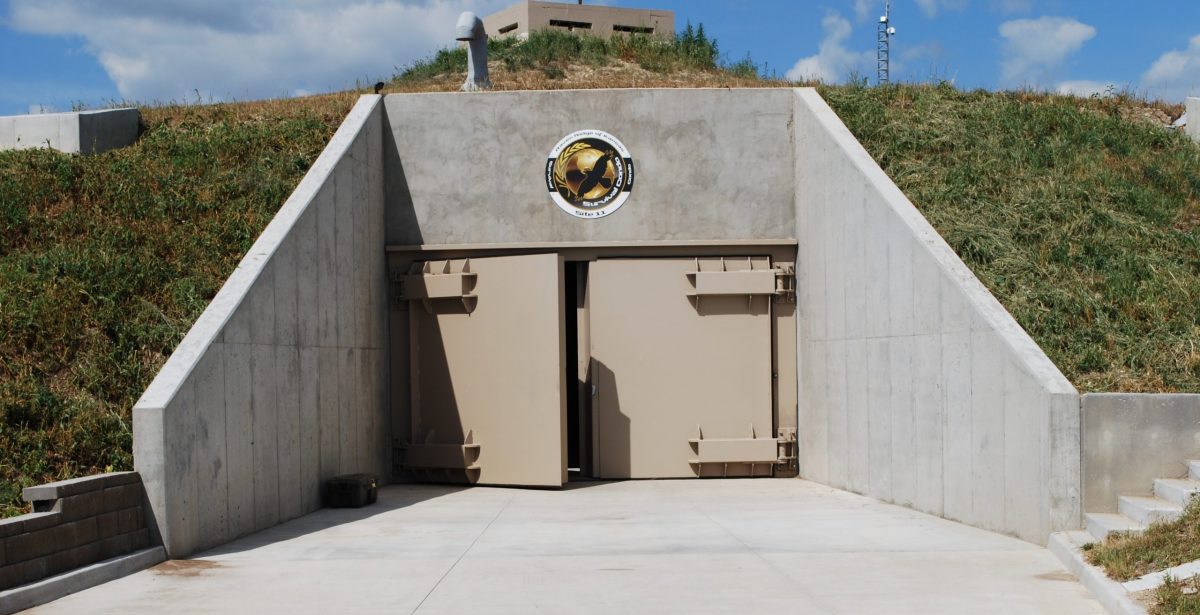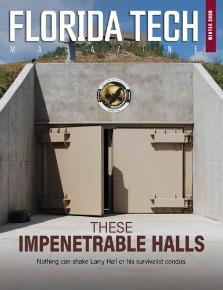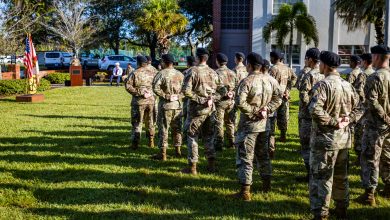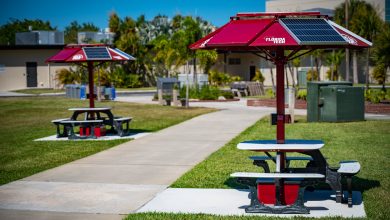Nothing Can Shake Alumnus Larry Hall or His Survivalist Condos
By Tom Kertscher
“Oh, a storm is threat’ning
My very life today …”
Fifty years after the Rolling Stones recorded the apocalyptic rock song, “Gimme Shelter,” which Mick Jagger called “a very moody piece about the world closing in on you a bit,” across Kansas, it’s partly sunny and summer-like on the second day of autumn.
But should the Stones hit one day prove to be prophetic, Larry Hall ’79, ’80 MBA, ’83 M.S., will be ready.
Welcome to Hall’s Survival Condos, two former Atlas missile silos turned into condominiums.
Their incongruous motto: “Survival Bunker Security/Full Luxury Resort Living.”
“Something that I particularly feel great about is that we took a weapon of mass destruction, which was designed to kill people, and we turned it into the complete opposite,” Hall says. “It’s now something that is designed to save lives and protect families.”
In recent years, doomsday preparation has become a multimillion-dollar business, a curve Hall was arguably ahead of when he launched his bunker-designing business in 2004. But the suburban Denver resident, a former scholarship-earning basketball player and magna cum laude student at Florida Tech, doesn’t always feel appreciated for his efforts.
Florida Tech Advantage
 Hall says his three degrees from Florida Tech propelled him to high-level technology jobs before he started working on the condos. He worked for Northrop Grumman Corp. as a consultant for 10 years, was a project manager on the Tracking and Data Relay Satellite System with Harris Corp. (now L3Harris Technologies Inc.) and was head project manager for a fiber-optic guided missile training program for DBA Systems Inc. in Melbourne.
Hall says his three degrees from Florida Tech propelled him to high-level technology jobs before he started working on the condos. He worked for Northrop Grumman Corp. as a consultant for 10 years, was a project manager on the Tracking and Data Relay Satellite System with Harris Corp. (now L3Harris Technologies Inc.) and was head project manager for a fiber-optic guided missile training program for DBA Systems Inc. in Melbourne.
“Early in my career, I would run into people who had gone to Duke, MIT and other well-known engineering schools, and they would ask, ‘You seem to be a leg up on people; where did you get exposure to program management?’” Hall says.
“I attribute Florida Tech and its faculty,” he says. “The guy who taught me program management was in charge of future programs for NASA. And the guy who taught me production management was the guy who set up the machine shops for General Motors. The people who were teaching the courses at Florida Tech were people who were doing it for a living.”

The Condos
The idea for the condos emerged shortly after the 9/11 terrorist attacks in 2001.
“There were a lot of people who thought that because of 9/11, we were in for a new level of global terrorism,” Hall recalls. “If they could strike in the U.S. in New York City and take down landmark buildings, is this the sign of things to come?”
Hall initially thought about developing nuclear-resistant, underground data centers. But he changed course after a friend asked, “Why don’t you protect people instead of computers?”
One of the 12-unit Survival Condo developments has been completed, and the other, also in Kansas, is under construction. Units are advertised as ranging from 920 square feet for $1.5 million to 3,600-square-foot—ironically named—“penthouse” units for $4.5 million.
No, banks generally won’t finance them.
“There are many bunker products less expensive than ours, and there are some that are more expensive than ours,” Hall says. “But in terms of value, I believe we have the best product.”
Some of the security features in Hall’s condos: redundant water supply with minimum 75,000-gallon reserve tanks; redundant air filtration, including nuclear, biological and chemical (NBC) filtration; organic, hydroponic and aquaculture food production; and a command and control center.
Some of the communal luxury features: an indoor pool and spa, a theater, an indoor shooting range and a dog park. Inside the units: high-end stainless steel appliances, Jacuzzi tubs in the master bathrooms and Kohler bath fixtures.
“This gave people the ability to maintain their lifestyle and still protect their family and not be dependent on the outside for their food, power, water, safety—and that struck a chord,” Hall says. “People really liked the concept.”
Despite—or perhaps due to—the highly limited availability of what the website calls “total ‘life assurance’ for you and your family in the event of just about any major crisis,” the Survival Condo gets serious attention.
In August 2019, Hall was featured in a New York Times story (the dateline was “201 FEET UNDERGROUND, Kan.”) that declared “A Boom Time for the Bunker Business and Doomsday Capitalists.”
Hall has also been in similar stories in the Wall Street Journal, the New Yorker and “60 Minutes Australia.”
Luxury was the route to go, Hall says, because the condo prices have to be high to pay for the infrastructure, such as 200-foot elevators and NBC filtration systems.
“Everything goes in chunks of half a million dollars,” he says.
All the residents, according to Hall, are self-made millionaires, including doctors, engineers and international business executives.
“There are some famous people,” he adds, “but we can’t get into names because of nondisclosure agreements.”
Sticking to It
Hall says he’s been able to ride out the backlash he gets.
“I’ve had the criticism, ‘Well, aren’t you really just marketing fear?’” he says. “I say, ‘Wow, isn’t that the opposite of the truth here?’ I don’t print the headlines; the media does. And the media is creating the fear that is making people anxious. So I’m responding to a fear that they’ve created by providing something that alleviates that fear.’”
Hall says he’s also empathetic to people who worry for their safety but can’t afford his condos, but he won’t let criticism that he’s serving only elites deter him.
“I’m not going to let them rain on my parade,” he says. “I really feel good about what we’ve built here, and I’m going to keep building them. It’s a good thing; it’s not a bad thing.”

This story was featured in the winter 2020 issue of Florida Tech Magazine. Read the full magazine here.












